I was rather late to festivals, having seen the hippy mud baths in the press throughout my twenties, it put me off. But my parents took me to Knebworth to see the Rolling Stones and Van Morrison in my childhood.
I first went to Glastonbury in 1989. We bunked in - a farmer gave us a lift, for a fiver, from the station to a place in the woods where you could access the festival. It felt dodgy, dumped in the middle of trees and just hoping it would lead somewhere. Once we got there, it was like a scene from Mad Max 2, huge modified mongrel vehicles with giant tyres revving around through the dust (I guess this was Mutoid Waste). In the middle of the night there was a rave, the second summer of love. Someone played electric guitar all night, badly, so we couldn’t sleep. When I got back to London three days later, I felt like I’d been on a different planet. Things never looked the same and I was hooked.
The next few Glastos were in the late 90s when I was a single mum returned from Paris. These were the muddy years, 96 and 97, where getting from one field to another took hours because your feet got stuck. The effort of pulling out suctioned sticky wellingtons was heavy going. I asked a Samaritans stall if they got more customers when it was rainy - no we get less, they told me, because every one is so busy trying to survive they haven’t got time to be depressed.
Then Glastonbury became more corporate, more organised. There weren’t the magical and weird moments as you tramped around the fields in the night, the secret bars, the impromptu bonfires and gigs.
By 2008 you had to queue to get into Lost Vagueness, the most alternative part of the festival. You were ferried around by stewards in high viz jackets. Then I got my wheel barrow stolen - I had it to transport my daughter - a portable cot- so I could go out in the evening. One year I was a priest ‘marrying’ people in a boxing ring, a gig I got through my sister, who often did street theatre at festivals.
When I started my supper club in 2009, I tried to get a food stall at Glastonbury but never heard back. I did Camp Bestival and Bestival instead- the first proper sit down restaurant pop up - three sittings a day. It was a tremendous amount of organising to set up - at least three months. By the end I thought, if I can do this I could run a war. After all Napoleon said an army marches on its stomach. It’s all about supply lines and provisioning.
The first one I did, Camp Bestival, I was let down badly by my team, who I knew and trusted. What I hadn’t reckoned on was their complete naivety about festivals. They were hospitality pros, not travellers and hippies. Camp Bestival is basically a children’s festival - half the clientele are under five. So it wasn’t wild but my staff went crazy. They took lots of drugs and turned up on shift with their pupils blown, gurning. They slept with each other - betraying long term partners at home – I’d have to kick tents in the morning to get them up. They left me, my sister and one loyal chef to pack away everything - this after working 20 hour days. My blood pressure went so high I had to take statins to cope. I sacked the lot of them.
The Wilderness crew turned up and watched what I did - I think their festival - which I’ve never been invited to- was based on my template- long tables, posies of flowers, set menus, music, themed dinners.
At Bestival on the Isle of Wight I did a pirate theme with sea shanty music. I got in props, had menus made like treasure maps, cocktails in coconut shells, boats, rigging and floorboards. Again festival behaviour ruled but this time with the guests, I was hard-core with the staff, I’d learnt my lesson. Guests booked a meal at a certain time, but people would turn up for their booking days before or after. You can’t keep track of time at a festival. Although it was very funny, we had to learn to be flexible.
In subsequent years I’ve been to Latitude in Suffolk, on a heatwave year, where we were desperate for shade and water. Sometimes the hot years can be tougher than the muddy years. Last year I went to the Kite festival, which was more a festival of talks and ideas than music. Pre-lockdown I attended the fairy-tale like Timber festival, which celebrated wood and trees and forests.
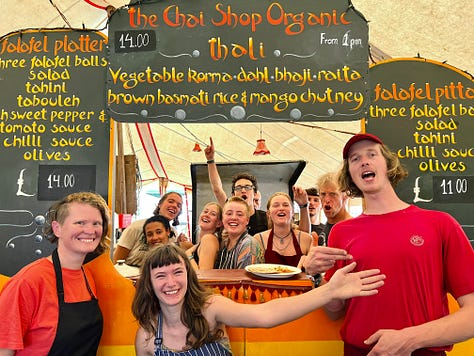
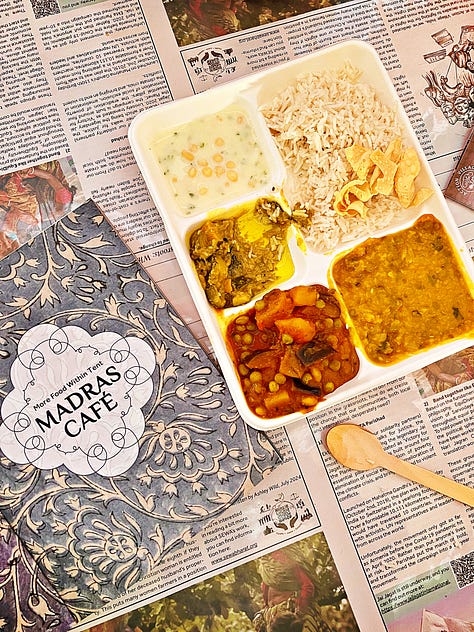
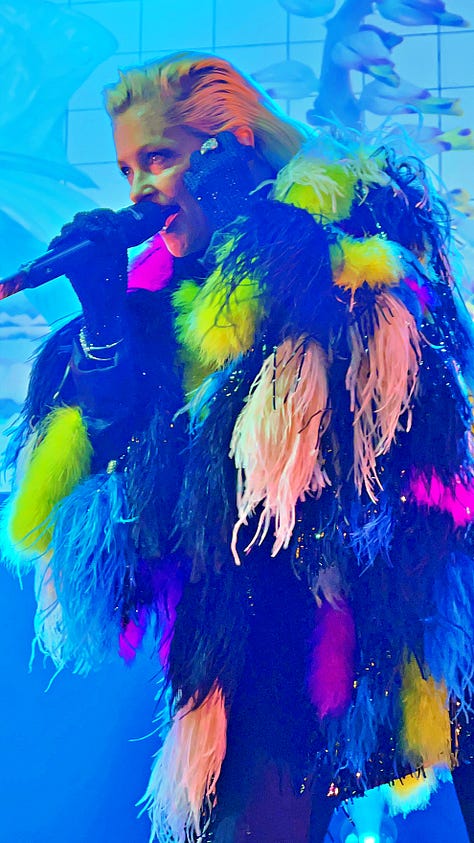
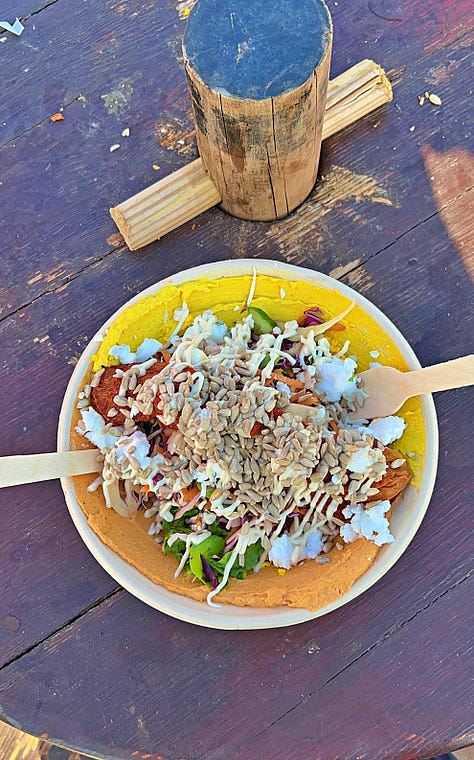
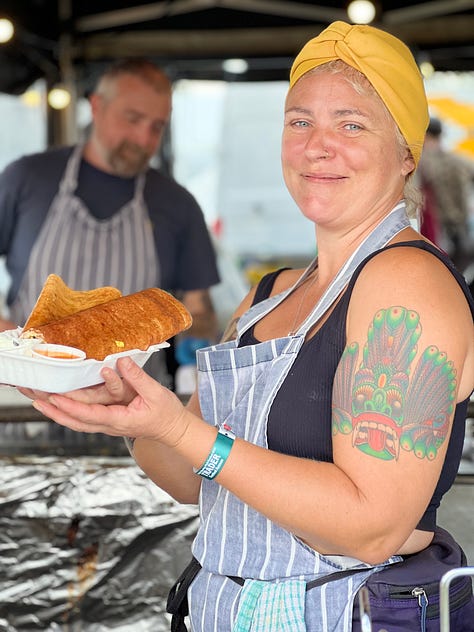
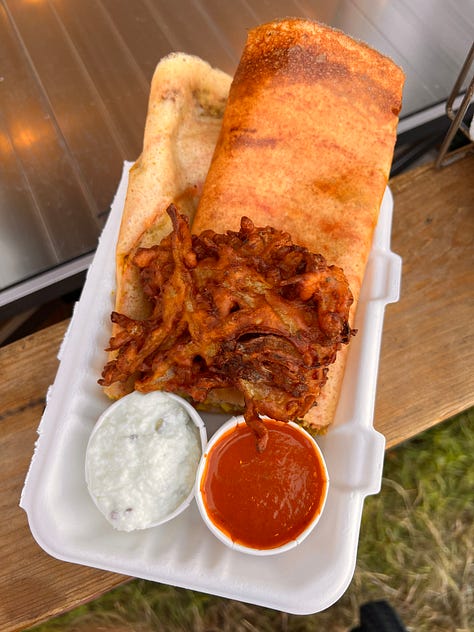
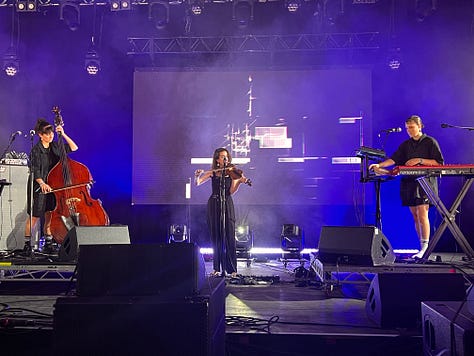
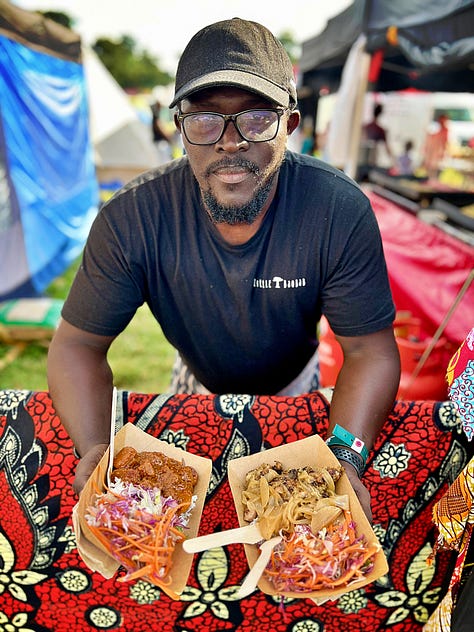
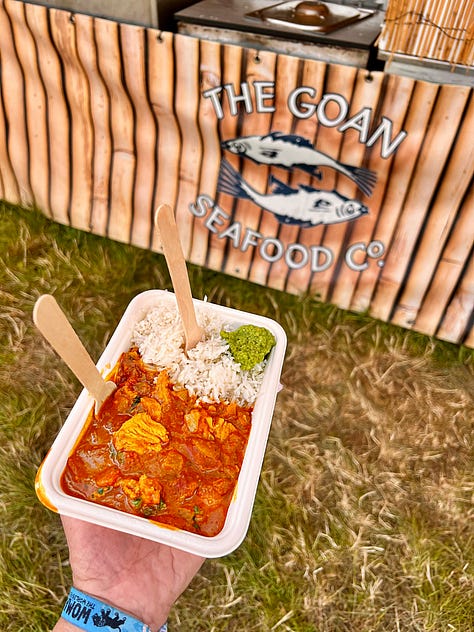
Womad:
I went to Womad back in 2016 and again last weekend. My technique with festivals is to plan to see a couple of acts but generally wander about, leaving things to chance and serendipity.
Here’s my report on this year’s Womad- which is naturellement very food centric.
I talked about the food to @radiowomad and interviewed a few of the stallholders.
Most of the food stands have been going for years even decades. Many of them don't do social media because they already have a huge following, just from word of mouth. Most dishes are between £11 and £14. Food prices are rising at festivals but, as I know from my own experience, you don’t make much money unless you are doing burgers and chips.
The food:
At @littlebaobabuk or Senegalese Soul Food there were huge queues: I loved the mafe peanut stew and my mate Jim enjoyed the roasted meats. The chefs are musicians - they were playing as well as cooking.
The Chai Shop Organic has been there 20 years. Joe and Elan run it. Joe told me that different food sells at different festivals and at Womad it's the thali. Joe has made food for Van Morrison and Chris Martin in the past. The staff are family, always turn up for shifts, they learn responsibility. ‘It’s almost like an alternative national service’ I suggest. On Sunday, but no other days, there are queues for the full English breakfast. People treat themselves to a big breakfast on the last day. Joe says they do deals for families, for instance, two big breakfasts for the adults and some free smaller portions for the kids.
Goan Fish Curry has been going 19 years. The owners are Cornish & use their fishing contacts to get fish. They use pollock, a sustainable by-catch.
@delidosa run by Amy & Kristian. They travel to Bangalore every winter & research techniques in darshinis, self service cafes serving South Indian food. Amy was so interesting, I would love to go on a food tour with her. Delicious dosas & enormous onion bhajis with coconut chutney/sambal
Crumble Shack this is just what you want on an English summer's eve, when frankly it is quite cold even if it’s sunny during the day. Choose your fruit, your topping and custard or ice cream. Delicious.
HummusSapien is a newbie: hummus bowls, made from scratch, soaked broad beans not chickpeas, lovely fresh textural salads and grains. Started by Jasper. Fantastic lunch for when it's good weather & you want something both tasty and healthy after a few days of caning it.
The longest serving food stall, 31 years at Womad, is the Madras Cafe. Authentic thalis, 2 veg curries, Dahl, yoghurt chutney, rice. All proceeds go to charity, Action Village India, run by volunteers. I loved their cookbook too.
The music
Womad is known for world music, for performers that aren’t mainstream. It’s an education in music.
Alison Goldfrapp, one of the UKs most talented female musicians, was headlining on the Saturday night. Her 2013 album Black Cherry was on permanent rotation at my house and several of her tracks are on my Spotify favourites. Madonna was influenced by her.
I really liked a musician called tlk, Bristol based, in the Soundscape tent. It was filmic, immersive, expressive and polyphonic.
Tibetan singer Yungchen Lhamo delivered a trancy, emotional performance on the Charlie Gillett stage. Unfortunately I missed her momo and butter tea demonstration at the Taste of the World tent. I’ve got a broken ankle and couldn’t get about that much. Still I was doing 10 to 15k steps a day in my ‘boot’ which isn’t bad.
John Metcalfe played on Friday night. His latest project is called ‘tree’ featuring music that is a melange of classical and electronica alongside nature inspired audiovisuals.
The Science tent was surprisingly interesting - some great talks but not having slept well and having taken an edible, I almost keeled over into the aisle.
This festival is clean, no litter, no doubt due to the green credentials of the clientele. It’s a great place for families. Lots of older people, who are after all the original hippies, but also teenagers going to their first rave in a safe environment.
My only complaint is the monolithic politics of the event. Every band was like ‘free Palestine’ - the flags were greatly in evidence too. It’s a nice slogan, after all who doesn’t like freedom? But the situation is complex and not worthy of trite virtual signalling. This chant rather spoilt the performance by Young Fathers.
One woman got on stage at the Science tent, doing a non-witty ditty about science and managed to wedge in some insults about terfs. Er, the audience was overwhelmingly older women - I imagine quite a few of us believe in single sex spaces.
Womad is pervasively Green in terms of politics. My mate Jim suddenly muttered ‘I really like petrol’. ‘So do I’ I agreed. And we giggled conspiratorially like naughty children. It felt like a punk statement, against the establishment.
I love driving. I love having a car. It’s given me freedom. A woman from Oxfam came over while we were eating and asked us to sign up to something. When I said that the protests of Just Stop Oil were turning me against Green politics, she said ‘oh you are climate deniers are you?’. Superiority and judgement is never a great way to persuade people.




I don’t think I would have the stamina to run a food stall at a festival, even less so these days.